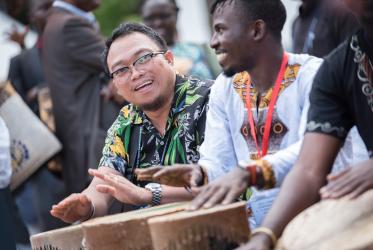Dr Susan Parry has turned her vision of the “AIDS-competent church” into a reality that has helped thousands of people across southern Africa and the rest of the world whose lives are affected by HIV.
Parry explains the need to move beyond the “AIDS-friendly church” to the “AIDS-competent church”, noting that, while the first denotes tolerance, acceptance, and a welcoming attitude, the AIDS-competent church goes many steps further.
“An HIV and AIDS-competent church denotes a well-informed, inclusive, proactively responsive and accompanying church. To achieve this involves strong leadership, accurate up-to-date knowledge, appropriate resources and networks, transforming theology and compassionate solidarity that restores dignity and hope.”
Parry, with a medical background in hematology and pediatrics, is well-positioned to define and communicate the best practices among churches in their response to AIDS. Author of “Beacons of Hope: HIV-Competent Churches,” Parry is a regional coordinator for the Ecumenical HIV and AIDS Initiative in Africa (EHAIA). Her region comprises 12 countries and some additional islands.
Parry's thoughtful research, combined with her passion regarding stronger church response to HIV and AIDS, helped lead to the establishment of EHAIA in 2001.
In 1999, when representing the World Council of Churches (WCC) at a conference on community-based care in Paris, she heard vehement condemnation of faith-based organizational response to AIDS, particularly with regard to prevention.
She then realized the critical need for faith-based organizations to be visible throughout the world, both as participants for learning and as contributors for sharing the extensive amount of care work that churches are doing in response to HIV and AIDS.
A pioneer of faith-based AIDS advocacy
In 2000 and 2001, Parry undertook a number of country mapping studies for the WCC, looking at HIV and AIDS in the countries, national responses, United Nations and non-governmental organizational response, and church response. She asked: “What are the gaps and where are the opportunities?”
She also took part in consultations with church leaders in Africa, where AIDS was raised as an emerging critical issue.
In 2003, at a Global Partners Forum organized by UNICEF and UNAIDS, she presented “Responses of Faith Based Organizations to HIV /AIDS in Sub Saharan Africa,” a report which covered 52 countries. This report sought to highlight the credibility and the contributions of faith-based organizations to HIV and AIDS, as well as the potential.
It also challenged the inequity of funding and the mistaken belief that, by funding a faith-based organization, one was funding a denomination rather than non-partisan service delivery.
Since then, Parry's expertise has continued to reach beyond southern Africa, with grassroots education and support in eastern, western, and central Africa, as well as, for the first time, in Portuguese-speaking countries in Africa and elsewhere around the world.
An illustration of Parry's personal influence as well as EHAIA's organizational strength took place in Madagascar, a huge island and independent nation off Africa's east coast. After discovering no “imported” solution would be effective, Parry and other EHAIA leaders visited with a large group of Madagascar's church leaders from different denominations.
They listened to a representative from the country's Ministry of Health, who stated: “There is a great need for the churches to work together, and together with government, to address HIV.” In a telling aside, the translator whispered: “Churches working together! That will never happen in Madagascar!”
Over the next few years, that translator was proved wrong, and EHAIA still continues its complex and challenging work, hosting workshops for church leaders, youth, lay people, theological institutions and others in different parts of the island.
Meanwhile, Parry resolves to continue her work as HIV remains a challenge to individuals, family members, churches, communities and the wider world. “It challenges us to rethink who we are, our responsibilities one to the other and who we are called to be,” she says. “A virus that is ever-dynamic requires ever-dynamic responses. It can never be ‘business as usual.’ ”
[640 words]
This article is the first in a portrait series presenting the work that EHAIA is doing through its regional coordinators and theological consultants. The series is published ahead of EHAIA’s 10th anniversary coming up in April 2012.









